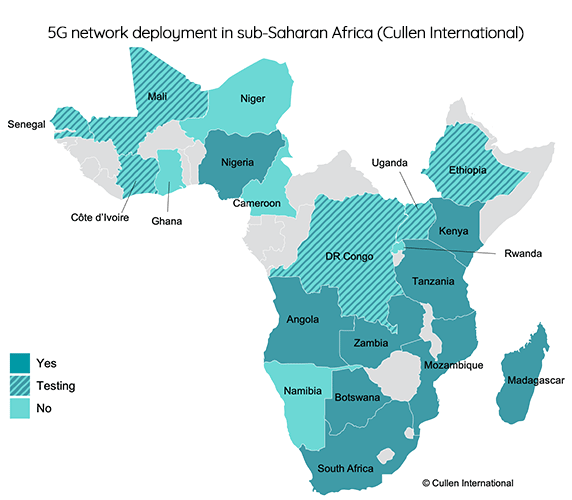Some countries in sub-Saharan Africa are already implementing their plans on 5G, while others are yet to start considering the introduction of 5G networks and services.
Cullen International’s new benchmark covers 20 countries in sub-Saharan Africa, of which several have recently decided to make available spectrum suitable for 5G deployments.
- In some cases, the regulatory authorities assigned spectrum to mobile network operators (MNOs) for mobile services, typically in competitive procedures such as auctions or beauty contests.
- In other cases, the authorities decided that spectrum already licensed to MNOs could be used also for 4G and 5G deployments, in accordance with a technology-neutral licensing approach.

For each of the 20 countries, the benchmark :
- analyses the national strategies and policies for 5G network deployment;
- indicates where regulatory authorities have identified pioneer spectrum bands or made initial 5G spectrum assignments; and
- provides relevant examples of 5G trials or commercial offers.
The benchmark covers: Angola, Botswana, Cameroon, Côte d'Ivoire, Democratic Republic of Congo (DRC), Ethiopia, Ghana, Kenya, Madagascar, Mali, Mozambique, Namibia, Niger, Nigeria, Rwanda, Senegal, South Africa, Tanzania, Uganda, and Zambia.
more news
25 February 26
Protection of minors: overview of national initiatives on banning access to social media
Our latest benchmark shows that an increasing number of European countries are discussing a potential social media ban on children.
23 February 26
The DNA explained: universal service to serve the same goals under a revised approach
Cullen International is issuing a series of analyses on different aspects of the Digital Networks Act (DNA) proposal. This report covers universal service.
20 February 26
Revised Cybersecurity Act (CSA2) - Changes to the EU cybersecurity certification framework
Cullen International published an analysis of the proposed changes to the EU cybersecurity certification framework under the draft Cybersecurity Act 2 (CSA2) delivered by the European Commission on 20 January 2026.